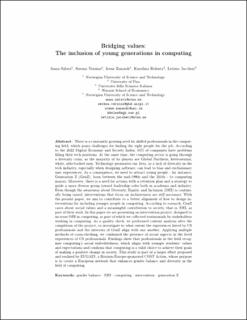Bridging Values: The Inclusion of Young Generations in Computing
Journal article
Submitted version
Permanent lenke
https://hdl.handle.net/11250/3113782Utgivelsesdato
2023Metadata
Vis full innførselSamlinger
Originalversjon
Lecture Notes in Computer Science (LNCS). 2023, 14020 154-170. 10.1007/978-3-031-35681-0_10Sammendrag
There is a constantly growing need for skilled professionals in the computing field, which poses challenges for finding the right people for the job. According to the 2022 Digital Economy and Society Index, 55% of companies have problems filling their tech positions. At the same time, the computing sector is going through a diversity crisis, as the majority of its players are Global Northern, heterosexual, white, able-bodied men. Technology permeates our lives, so a lack of diversity in the tech industry, especially when designing software, can lead to bias and exclusionary user experiences. As a consequence, we need to attract young people - for instance, Generation Z (GenZ), born between the mid-1990s and the 2010s - to computing majors. Moreover, there is a need for actions with a retention plan and a strategy to guide a more diverse group toward leadership roles both in academia and industry. Even though the awareness about Diversity, Equity, and Inclusion (DEI) is continually being raised, interventions that focus on inclusiveness are still necessary. With the present paper, we aim to contribute to a better alignment of how to design interventions for including younger people in computing. According to research, GenZ cares about social values and a meaningful contribution to society, that is, DEI, as part of their work. In this paper we are presenting an intervention project, designed to increase DEI in computing, as part of which we collected testimonials by stakeholders working in computing. As a quality check, we performed content analysis after the completion of the project, to investigate to what extent the experiences listed by CS professionals and the interests of GenZ align with one another. Applying multiple methods of cross-checking, we confirmed the presence of social aspects in the lived experiences of CS professionals. Findings show that professionals in the field recognize computing’s social embeddedness, which aligns with younger students’ values and expectations and confirms that computing is a valid choice to achieve their goals of making a positive change in society. This study is part of a larger effort proposed and realized by EUGAIN, a Horizon Europe-sponsored COST Action, whose purpose is to create a European network that enhances gender balance and diversity in the field of computing.
